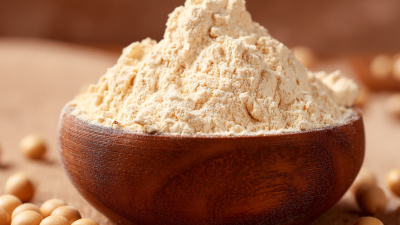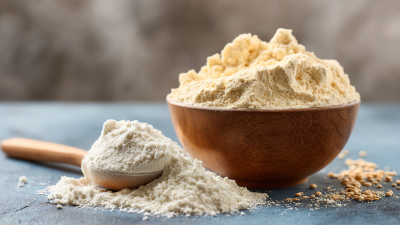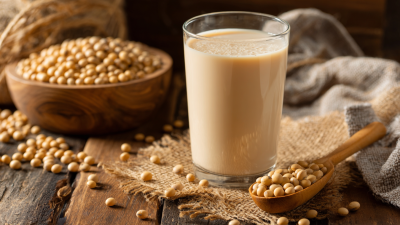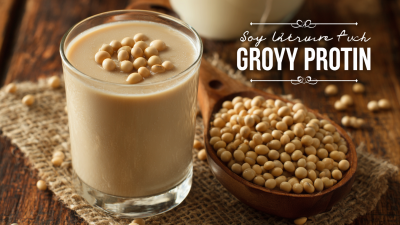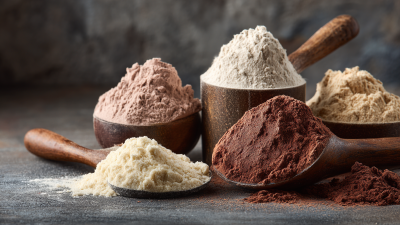The future of athletic nutrition is increasingly leaning towards plant-based solutions, with "Soy Protein Shakes" emerging as a frontrunner in this evolving landscape. According to a report by the Plant-Based Foods Association, the demand for plant-based protein sources has surged, with soy protein taking a significant share due to its impressive amino acid profile and digestibility.

Furthermore, research published in the Journal of Nutrition highlights that athletes utilizing soy protein can experience improvements in muscle recovery and performance, thanks to its rich nutrient content and ability to support lean muscle growth. As athletes and fitness enthusiasts look for effective and sustainable ways to enhance their performance, soy protein shakes stand out not only for their nutritional benefits but also for their environmental advantages, reinforcing the shift towards a more conscious approach in sports nutrition.
Athletes striving for endurance often seek effective ways to enhance their performance, and soy protein shakes have emerged as an ideal supplement for this purpose. Rich in essential amino acids, soy protein not only aids in muscle recovery but also promotes overall metabolic health. Recent studies indicate that plant-based proteins like soy can be just as beneficial as animal-based proteins, making them a great choice for those looking to optimize their diet without compromising their nutritional needs.
Incorporating soy protein shakes into your daily routine can provide significant advantages. Tip 1: To maximize the benefits, consider consuming a soy protein shake post-workout to help repair muscles and reduce recovery time. Tip 2: Blend your shake with fruits or vegetables to enhance flavor and increase nutrient intake, creating a delicious, nutrient-dense drink that aids both performance and health.

Furthermore, soy protein is easy to digest and can consistently fuel an athlete’s rigorous training cycle. Tip 3: Experiment with timing – consuming your shake before workouts may offer an energy boost, while post-workout supports recovery. Regardless of when you choose to have it, soy protein shakes can be a key player in your athletic performance arsenal.
Soy protein shakes have gained popularity in the athletic community, particularly for their role in enhancing muscle recovery post-workout. Research indicates that protein intake after exercise can significantly improve muscle repair and growth. A study published in the "Journal of Sports Nutrition" found that consuming 20-25 grams of protein within 30 minutes after a workout can optimize muscle recovery. Soy protein, being a complete protein, provides all essential amino acids needed for muscle synthesis, making it a preferable choice for athletes looking to replenish their nutrients efficiently.
In addition to its amino acid profile, soy protein shakes also contain isoflavones, which have been shown to possess anti-inflammatory properties. A review in the "American Journal of Clinical Nutrition" highlights that these compounds can help in reducing muscle soreness and enhancing recovery times. Athletes who incorporate soy protein shakes into their post-workout regimen may experience less fatigue and improved performance in subsequent training sessions, enabling them to train harder and recover faster. With such compelling evidence supporting the benefits of soy protein for post-exercise recovery, it’s clear that these shakes can be a crucial part of an athlete's nutrition plan.

The Role of Soy Protein in Strength Training: Facts and Figures
Soy protein has emerged as a key player in the world of strength training, offering a plant-based alternative that not only meets dietary needs but also enhances athletic performance. Research shows that soy protein provides a complete amino acid profile, making it an excellent choice for muscle repair and growth. A study published in the *Journal of the International Society of Sports Nutrition* found that athletes who incorporated soy protein into their post-workout nutrition showed a significant increase in muscle mass compared to those who did not, with a reported increase of about 7% over a 12-week training period.
In addition to promoting muscle growth, soy protein shakes have also been shown to improve recovery times. According to a meta-analysis published in *Nutrition Reviews*, participants who consumed soy protein were able to recover faster from intense workouts, experiencing a 20% reduction in muscle soreness and a quicker return to peak performance. This can be particularly beneficial for strength training athletes who engage in frequent, high-intensity sessions. With these compelling facts and figures, it’s clear that soy protein shakes are not just a dietary option but a strategic advantage for those looking to boost their athletic performance.
This chart illustrates the effectiveness of soy protein shakes in enhancing various aspects of athletic performance. The data reflects improvements in muscle gain, recovery time, endurance, strength, and overall performance based on research and analysis.
When it comes to athletic performance, protein intake is crucial for muscle repair and growth. Among the various protein sources, soy protein and whey protein are two of the most popular choices. Both offer distinct benefits, but they differ in composition and how they affect muscle recovery and growth. Soy protein, a plant-based option, is especially appealing for athletes seeking a dairy-free alternative. It is rich in essential amino acids and has been shown to enhance muscle protein synthesis effectively, making it suitable for athletes during recovery.
In contrast, whey protein is quickly absorbed and provides a rapid increase in amino acids in the bloodstream. This makes it ideal for post-workout nutrition when muscles are craving nutrients for repair. Research suggests that whey protein may be slightly more effective in stimulating muscle growth due to its high leucine content and fast absorption rate. However, studies have also indicated that combining soy and whey protein may yield synergistic effects, optimizing performance outcomes and muscle recovery.
Ultimately, the choice between soy and whey protein may come down to personal dietary preferences and specific athletic goals.
Timing your nutrient intake can significantly enhance your athletic performance, particularly when incorporating soy protein shakes into your routine. For optimal benefits, consider consuming a soy protein shake 30 to 60 minutes after your workout. This post-exercise window is crucial for muscle recovery and rebuilding, as the nutrients in soy protein can help replenish depleted energy stores and promote muscle synthesis.
Additionally, pre-workout nutrition can set the tone for your performance. Consuming a soy protein shake about 1-2 hours before your training can provide your body with the necessary amino acids and energy needed to thrive during rigorous activities. This approach not only fuels your workout but also helps in preventing muscle breakdown, allowing you to perform at your peak.
Another effective strategy is to integrate soy protein shakes into your daily meals as a snack or meal replacement. Consuming soy protein throughout the day can support muscle maintenance and endurance, ensuring that your body has a steady supply of protein for recovery and growth. This consistent intake, paired with strategic timing around workouts, can lead to improved athletic performance and overall health.
